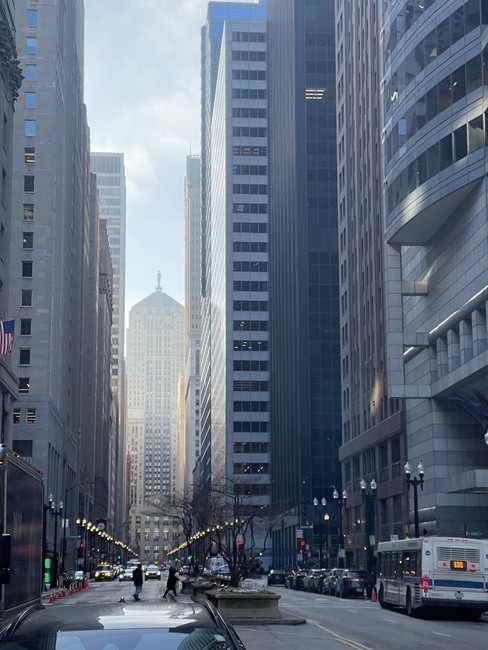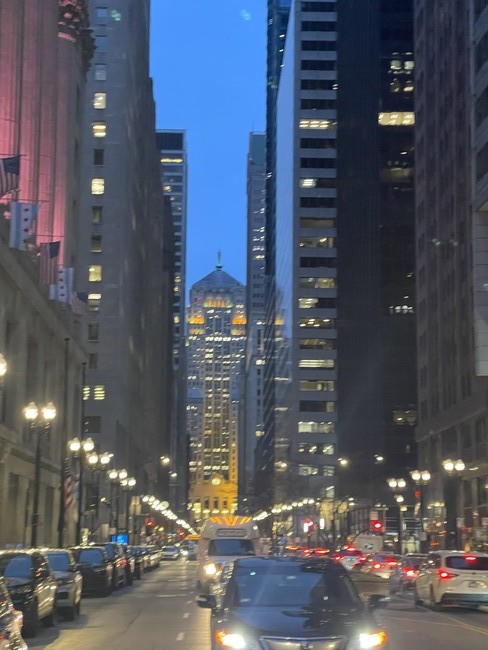Tearing Down


A few days ago I had to take my son somewhere during the day, and I walked by this excavator tearing down an old residential building near the university’s medical center. I don’t know anything about the history of this block, but the buildings were the only buildings in a wide area that appeared to have a residential purpose. They were adjacent to an empty lot, like they’d once been part of a residential area of which they were now the last holdouts. Next time I go by, I expect they’ll be gone.
I’d noticed these buildings before, and thought they looked out of place, like their walls were unclothed, meant to be hidden behind a jumble of similar buildings, zebra-like. Instead, in the last phase of life, they’ve been singled out, home to no one.
Most municipalities in the U.S. have land records about what stood on a piece of property. It would be difficult for any individual to review them on a large scale, and to understand the trends behind the factual archive. For the most part, the building is the archive. Once it is gone, even the people who lived there would have trouble locating the spot anymore. A memory of a physically uprooted place is an orphaned memory–a person can never go back and refresh it.
Beyond Originalism
David Cole points out that originalism, the interpretive doctrine most associated with the U.S. Supreme Court and Constitution, has attracted so much attention in recent eras that his readers need a reminder of the alternatives. Cole writes in the New York Review of Books:
But there is a familiar and sensible alternative—familiar because every judge and justice in the history of the United States has employed it most of the time, even the few who profess on occasion to be originalists. This method starts with the text of the Constitution but recognizes that the ways its broad and open-ended provisions apply will be elucidated gradually over time as judges confront particular cases and seek to make sense of what has gone before, analogize from precedent to contemporary circumstances, and explain their reasoning to provide guidance for the future. The University of Chicago law professor David Strauss has called this method “common law constitutional interpretation.”
Cole would likely agree that a “common law interpretation” of the constitution fails to qualify as a distinct method–and he might argue that this is a good thing.
Cole’s article made me think that a distinguishing quality of other modern traditions of Constitutional interpetation is their willingness to accept the improvisational quality of all interpretative activity.
Maybe originalism’s most defining feature is not a fidelity to any foundational set of figures, sources, or meanings; instead what sets it apart is a striving for interpretive formulas, and the (supposed) elimination of judicial discretion. Cole does not say this, but his description gave me the sense that originalism had more in common with trends like quantification in the behavioral sciences, scientism against cultural explanation, Darwinian materialism–and of course biblical fundamentalism. In a speculative future, we could imagine other “originalisms:” maybe one based on fidelity to the radio communications of an alien civilization, the runic stones of an ancient archaeological site, or the esoteric patterns of falling leaves in a pond. Those could also be “originalist” in the same spirit as constitutional originalism, if the point is to limit interpretative possibility, to make it seem methodical, bound by a foundational source.
Read more →November Migrations
Seen recently: the migrations of several hundred Canada Geese above my apartment.
They had likely staged at nearby Washington Park. I saw the same thing within a few days of this date last year.
The migrations of large birds, like the geese seen here, can be hard to ignore. When I stepped outside because of the noise, the birds appeared like they had forgotten how to organize. They cross each other’s path in a roiling mass, like ants on an uncovered mound. They were loud, it was an unsettling sight, as if I was witnessing a disturbance in the natural order:
They begin to fly roughly to the south:
The size of the migrating flocks may have something to do with their proximity to the lake. Kenn Kaufman writes in A Season on the Wind about the spring migration:
All over eastern North America at this moment, or at least all along the advancing edge of daylight, migrating birds are dropping out of the sky and looking for cover. In most places they are so widely dispersed that they’ll go unnoticed. But here, up against the barrier of the lake, numbers build as more and more birds pause and then come down before the water’s edge. In the trees, in the thickets, in the marsh edges, the arriving birds pile up. In the immediate vicinity of the lakeshore, so many small birds will concentrate that they’ll be impossible to ignore.
Visible migrations like this are rare. It’s a reminder of the thin but collectively huge layer of birds that streams across Chicago both fall and spring.
Read more →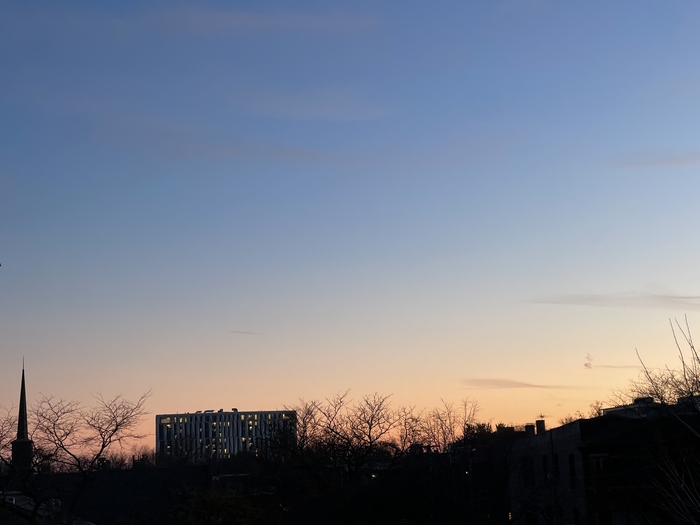
Sustained attention under internet conditions
“The most sustained focus that internet allows for is coding”
- Justin E.H. Smith, The Internet is Not What You Think It Is (2022)
Smith’s book is largely about the ways in which the internet–internet devices, internet-saturated environments, internet culture–limits or damages the human capacity for sustained attention. The idea may be polemical and overstated. There are any number of online media, especially of the video or game-driven sort, that go several steps beyond fostering sustained attention: they go all the way to addiction. But as far as productive human activities go, I think Smith may be onto something. Maybe there is so much software in the world today because we live in an attention ecology that is particularly conducive to this form of labor. Maybe coding is still a viable form of attention because it is “native” to the screen, both born of and resulting in the digital environment. In an age of automation, there is a certain sense to the idea that some of the last creative people are the ones designing the automation.
The concept of “literate programming” in computer science is usually attributed to Donald Knuth. It’s a proposal that code and documentation should be equal partners with one another, or even that most of what counts as coding would be a form of writing about code. Within this model the actual code would occur occasionally, parenthetically, once its meaning and purpose has been thoroughly explained. The idea is quite romantic, and often-dismissed in any kind of industry setting, or any other where code is primarily written to do something. But I like to think of a world, maybe hundreds of years in the future, where writing or maintaining code has become an all-consuming, near-universal human activity, where people begin to rediscover real writing–expressive, prose writing–through a delight hidden inside the instructions given to machines.
Read more →The leaf litter peak
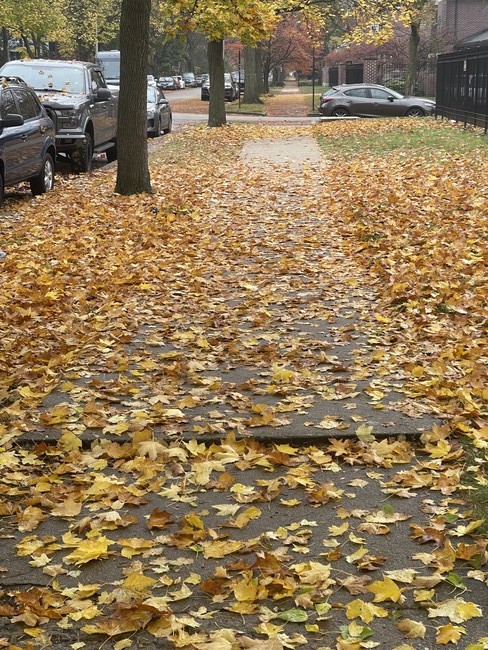
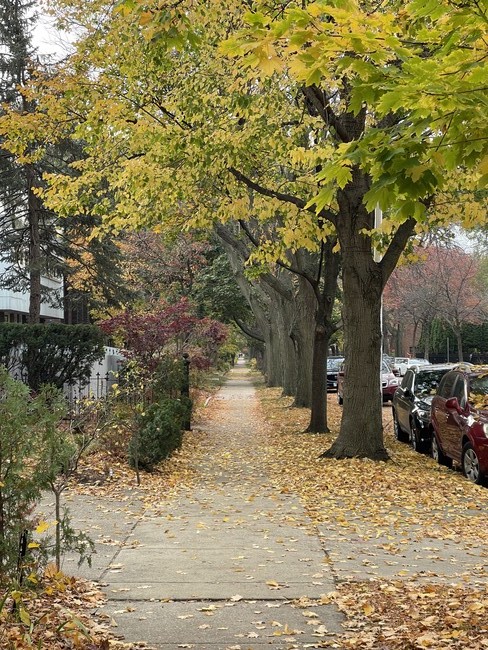
Moving toward late fall here in Chicago, and while the leaf colors are past peak, the amount of leaves on the ground has reached a high point. I notice them everywhere, on top of cars and under the wheels, covering sidewalks, and of course blanketing the ground. From what I see in the neighborhood here on the South Side, among the greatest generators of leaf detritus by volume are the maples (Acer), particularly the silver maple (Acer saccharinum) which I have seen planted both by the city in streets and parks and in private backyards. W.J. Bean writes in his Trees and Shrubs Hardy to the British Isles, that “owing to the rather brittle nature of the wood, it is not suitable for use as a street tree,” but current usage around here disproves that. Its leaves are almost always yellow, which is also, to my eye, the predominant color of fall in Chicago.
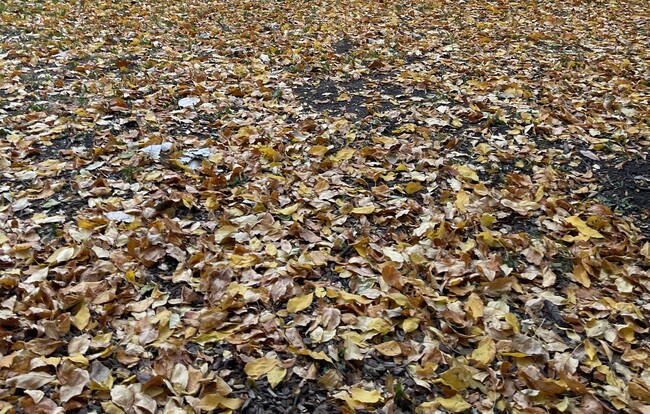
A New Translation of Manzoni's 'The Betrothed'
Joan Acocella’s reassessment of Alessandro Manzoni’s The Betrothed (I Promessi Sposi, 1827), in The New Yorker, is worth a read.

I went through large sections of the book near the beginning of the pandemic, and was delighted to see that Modern Library has published a new edition.
Annie Ernaux's Diaries
The Paris Review had good timing when it devoted space this past spring to 2022 Literature Nobel Winner Annie Ernaux, several months before she won the prize.
According to a blog post about the material published in May, the real diaries are the source material for her book Simple Passion (1991).
From the blog:
While reading an old diary, and letters she sent to a classmate, she recognizes certain falsenesses in them—pretensions, lies, self-deceptions. The quotations from books she copied down in 1958 now strike her as a more direct means of access to her state of mind then. All memoir involves time travel, and yet Ernaux, as she twists and turns, trying to cross the schisms between her various selves, manages to create what feels like a new tense—a literary time zone that can hold it all at once.
And
These diaries feel like gifts, or offerings, that are unlike any other kind of writing. There is, as Ernaux herself writes in a brief introduction, “a truth in those pages that differed from the one to be found in Simple Passion—something raw and dark, without salvation, a kind of oblation.”
Towers

Coon Valley, Wisconsin
Seen over the weekend: a microwave tower that was part of the now-abandoned “long line” telecommunications network.
This one is in good shape. It has an AT&T sign on the front, and it appears to be still maintained. One source says this could be for other radio broadcasts, or for cellular tower signals.
